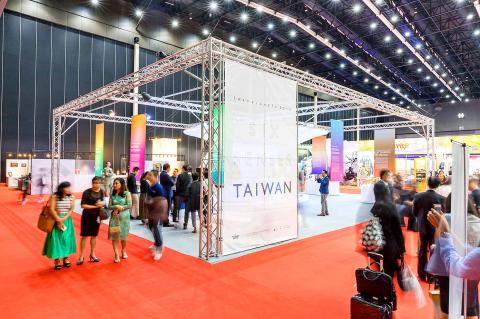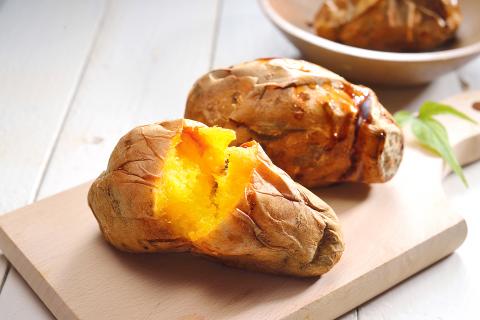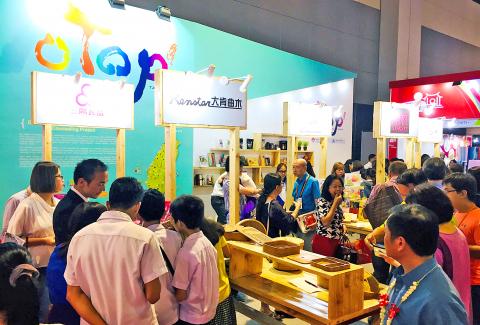K.K. Orchard (瓜瓜園), a farm-to-store sweet potato enterprise, is looking at a 20 percent increase in profits this year — but its ambitions do not stop there. In June, the company broke ground on a US$700 million sweet potato factory in Tainan, which is to become Taiwan’s largest when it is completed late next year. Its target? The Southeast Asian market.
While K.K. Orchard had been exporting produce to Singapore for more than 10 years, its expansion into the rest of the region was slow due to unfamiliarity with market needs, marketing director Carey Chen (陳慶玲) said.
Two years ago, the company set up a department focusing on the region that interacted with customers. Since then, business in the region has expanded to the Philippines, Singapore, Malaysia and Thailand.

Photo: CNA
“We started to actively interact with customers in the region regarding sales channels and consumer preferences, and this has opened up more opportunities,” Chen said.
As consumer spending power continues to boom in Southeast Asia, the consumer goods market is becoming increasingly important.
However, Taiwanese exports to Southeast Asia are still mostly dominated by industrial materials.

Photo courtesy of K.K. Orchard
A China Information Credit Services study released last month includes mostly consumer goods industries in its list of 13 industries that have an advantage in Southeast Asia, such as household appliances and products, recreational equipment, furniture, audio and video equipment as well as food and fashion.
“In the near future, consumer goods and services will be the market segments offering the greatest potential for rapid growth in the region, a situation which should benefit Taiwan’s innovative, flexible SMEs [small and medium-sized enterprises], helping them to establish a foothold in these markets,” the Small and Medium Enterprise Administration said in a report in February.
SHOWCASING TAIWAN

Photo: CNA
The Taiwan External Trade Development Council (TAITRA) has been organizing expos and exchanges between Taiwan and New Southbound Policy partner countries that aim to increase awareness of Taiwan as well as its products and technology.
The main event is the Taiwan Expo, which is held annually in the government’s six designated priority countries, Indonesia, Malaysia, Vietnam, Thailand, India and the Philippines.
K.K. Orchard has been an eager participant, and it was one of 19 food companies to present its wares in Manila in October last year.
The event was rewarding, with 148 local businesses attending and an estimated US$1.25 million worth of business opportunities conducted.
K.K. Orchard, in particular, received large orders from two major Philippine supermarkets.
Other types of consumer goods also regularly do well in the expos. In this year’s Thailand event that concluded on Sept. 1, Tokuyo received an entire shipping container’s worth of orders for its massage chairs, while attendees rushed to clear the expo’s inventory of dried meat, sweets and nano-tech underwear.
Eco-friendly products have also been a hit at the shows. Immediately after last year’s Taiwan Expo in Indonesia, the Green Trade Project Office took several Taiwanese companies to the Indonesia International Green Technology and Eco-Friendly Products Exhibition, displaying Taiwan’s ability to transform waste into clothing, glass products and other consumer goods.
EcoMax Textile Co (富勝紡織), which specializes in turning PET bottles into fabrics, attended both events and found that its scarves and other wrap-type fashion items were popular with Indonesian Muslim women.
The event’s success inspired company president Ko Han-che (柯漢哲) to personally attend last year’s Taiwan Expo in Vietnam, where he was further encouraged by local enthusiasm for his products.
One buyer even offered to provide land for Ko to build a factory in Vietnam.
While EcoMax has yet to cash in big on its southbound efforts, it has received increased interest from Southeast Asian countries ever since.
“It is a relatively new industry for these countries, but they have started to notice us,” EcoMax salesperson Yuan Su-fen (袁素芬) said. “We have been getting a lot of inquiries for sales and partnerships.”
HALAL CERTIFICATION
Tapping into the halal market is also extremely lucrative.
While K.K. Orchard already has halal certification, Chen said it plans to ramp up its efforts in the sector in the next few years.
In April, K.K. Orchard displayed its wares at the Malaysia International Halal Showcase, where Taiwan boasted the largest presence after Indonesia.
An estimated US$6 million worth of business opportunities were generated during the show.
The potential of the halal market should not be overlooked, as a Grand View Research report predicted that the global halal food and beverage market would grow from US$436.8 billion in 2016 to US$739.59 billion by 2025, with the Asia-Pacific region as the top consumer in 2016.
Within the region, Indonesia and Malaysia accounted for more than 55 percent of total demand.
TAITRA compares halal certification to an “entry ticket” into Indonesia and Malaysia, and established the Taiwan Halal Center in April last year to assist Taiwanese firms with the complicated process.
Since then, the number of halal-certified Taiwanese companies has grown from about 300 to more than 800 as of March, and TAITRA predicts the number will exceed 1,000 by the end of this year.
The majority of these are food companies, followed by beauty product manufacturers.
One of the beneficiaries is Tai Ping Yang Food Co, which specializes in fermented bean curd. Since it received halal certification, its sales in Southeast Asia have grown by about 20 percent annually.
E-commerce collaborations have also been a way to reach Southeast Asian consumers.
In August, TAITRA partnered with PChome Online Inc (網路家庭), Taiwan’s largest e-commerce operator, to set up a “Knock Knock Taiwan” specialty section on the company’s Thai Web site, with items ranging from selfie sticks to inflatable neck pillows and sporting equipment. Free shipping was provided for the first two months.
This came on the heels of similar partnerships with Vietnam’s second-largest e-commerce site, Tiki, in April, and Indonesia’s Bilibili in June last year.

A magnitude 4.9 earthquake struck off Tainan at 11:47am today, the Central Weather Administration (CWA) said. The hypocenter was 32.3km northeast of Tainan City Hall at a depth of 7.3km, CWA data showed. The intensity of the quake, which gauges the actual effect of a seismic event, measured 4 in Tainan and Chiayi County on Taiwan's seven-tier intensity scale, the data showed. The quake had an intensity of 3 in Chiayi City and County, and Yunlin County, while it was measured as 2 in Kaohsiung, Nantou County, Changhua County, Taitung County and offshore Penghu County, the data showed. There were no immediate reports of

‘DENIAL DEFENSE’: The US would increase its military presence with uncrewed ships, and submarines, while boosting defense in the Indo-Pacific, a Pete Hegseth memo said The US is reorienting its military strategy to focus primarily on deterring a potential Chinese invasion of Taiwan, a memo signed by US Secretary of Defense Pete Hegseth showed. The memo also called on Taiwan to increase its defense spending. The document, known as the “Interim National Defense Strategic Guidance,” was distributed this month and detailed the national defense plans of US President Donald Trump’s administration, an article in the Washington Post said on Saturday. It outlines how the US can prepare for a potential war with China and defend itself from threats in the “near abroad,” including Greenland and the Panama

The Chinese Nationalist Party (KMT) is maintaining close ties with Beijing, the Democratic Progressive Party (DPP) said yesterday, hours after a new round of Chinese military drills in the Taiwan Strait began. Political parties in a democracy have a responsibility to be loyal to the nation and defend its sovereignty, DPP spokesman Justin Wu (吳崢) told a news conference in Taipei. His comments came hours after Beijing announced via Chinese state media that the Chinese People’s Liberation Army’s Eastern Theater Command was holding large-scale drills simulating a multi-pronged attack on Taiwan. Contrary to the KMT’s claims that it is staunchly anti-communist, KMT Deputy

RESPONSE: The government would investigate incidents of Taiwanese entertainers in China promoting CCP propaganda online in contravention of the law, the source said Taiwanese entertainers living in China who are found to have contravened cross-strait regulations or collaborated with the Chinese Communist Party (CCP) could be subject to fines, a source said on Sunday. Several Taiwanese entertainers have posted on the social media platform Sina Weibo saying that Taiwan “must be returned” to China, and sharing news articles from Chinese state media. In response, the Mainland Affairs Council (MAC) has asked the Ministry of Culture to investigate whether the entertainers had contravened any laws, and asked for them to be questioned upon their return to Taiwan, an official familiar with the matter said. To curb repeated